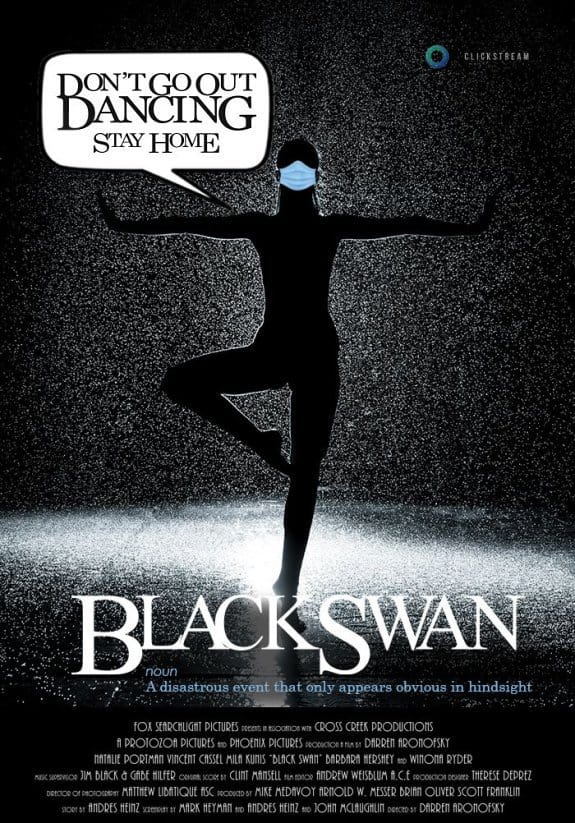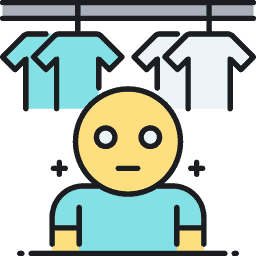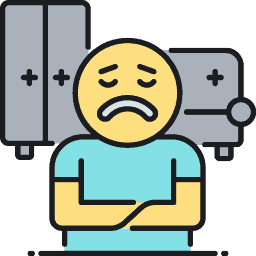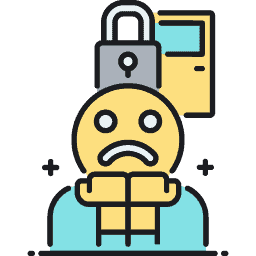
Share this Image On Your Site
Many of us pick up small, comfortable habits over time that are part of strict routines. They make us feel better or add to a daily plan which makes our lives easier in small ways. For most of us, these quirky habits are comforting, reassuring even. Extreme OCD symptoms look very, very different.
OCD is a disability for many and in many countries, that means government assistance is also available. For those who suffer from obsessive-compulsive disorder (OCD), “quirky” doesn’t even describe their behavior.
Obsessive-compulsive disorder can have life-altering effects and significantly impact one’s quality of life. The difference between small habits you pick up and OCD is that OCD is more intense and is fueled by persistent thoughts that just will not go away.
Try Online Therapy
Get professional help from Betterhelp’s network of 30,000 licensed therapists. You can get matched with a therapist in 48 hours or less without spending hours looking for one yourself.
OCD & Isolation in the Turbulence of the COVID-19 Pandemic

The existing scientific literature on obsessive-compulsive disorder (OCD) establishes that OCD can range in severity from mild to debilitating, manifesting in anything from eccentric to self-destructive behavior.
With the rampant spread of COVID-19 (more commonly known as the Coronavirus disease), medical professionals and lawmakers alike are putting increasing pressure on citizens to self-isolate to slow the infection rate. During this time, it’s worth asking what prolonged periods of involuntary isolation can do to aggravate the conditions of those suffering from mental illness and psychotic disorders.
Persistently recurring thoughts or sensations that lead to compulsive behaviors that characterize OCD can certainly be worsened by protracted isolation periods. Isolation in turbulence — such as a lockdown during a pandemic — brings uncertainty, stress and fear. All of these only intensify the underlying issues of OCD, which is at its heart an anxiety disorder.
The intensity of the connection between isolation, obsession and compulsive behaviors is well-illustrated in Darren Aronofsky’s Black Swan[easyazon_link identifier=”B004Q08BE2″ locale=”US” tag=”descofthein0a-20″]Black Swan[/easyazon_link] (2010). In the movie, timid protagonist Nina Sayers grows increasingly alienated from her peers and loved ones as she endeavors to relinquish her innocence and become the consummate black swan — a mercurial and impetuous counterpart to her formerly fragile and gentle self.
Black Swan & OCD in the Age of Coronavirus
While Black Swan paints a powerful picture of the role of isolation in obsessive-compulsive behavior, the reality of the relationship between the two is not limited to movie scripts. There are authoritative and frequently cited studies that conclusively establish this connection in scientific literature.
The current consensus among medical professionals is that a period of lockdown is absolutely necessary to combat the Coronavirus outbreak. However, it’s worth noting that prolonged periods of isolation (some lawmakers are calling for lockdown periods of up to two months) could have adverse effects on individuals already struggling with OCD and other psychiatric or anxiety disorders.
Check out our top-rated therapy services. Healthy Minded visitors get a 15% discount.

Exploring the Role of Obsessive-Compulsive Disorder in the Movie Black Swan
In Black Swan, the protagonist’s constant grappling with OCD in a milieu of increasing self-isolation is arguably the catalyst for every major event in her descent into madness. The audience is quickly introduced to Nina’s obsessive-compulsive nature with Aronofsky’s depth of cinematography emphasizing her intense perfectionism in practice, painfully swollen feet and utter lack of interest for anything other than dancing.
Her typical days consist of nothing more than practice and immediately returning home to her equally obsessive mother Erica — a failed, neurotic former dancer who has no life outside of the one she lives vicariously around her daughter’s career. Through Erica’s intrusively controlling demeanor, unreasonably high standards, and room filled with pictures of her daughter, Aronofsky suggests a root cause of Nina’s OCD is a lifetime’s worth of interaction with her mother.
You can read the full plot analysis here. Spoiler alert… If you haven’t seen the movie and don’t want to know what happens, skip the next two paragraphs.
Before long in the plot, Nina’s own obsession with capturing the duality of her role as the swan queen — along with her mother’s — has spurred her OCD into a dangerous psychosis. Nina begins to regularly return from practice only to shut her mother out completely and continue practicing in her room, losing sleep and breaking down from overtraining until she splits a toenail.
Upon incurring this potentially compromising injury, Nina develops suspicion and paranoia of her understudy Lilly, ultimately murdering her on the ballet’s opening night (in what Aronofsky intentionally leaves ambiguous as either a real or imaginary encounter in a dressing room).
[easyazon_link identifier=”1572249218″ locale=”US” tag=”descofthein0a-20″] [/easyazon_link]
[/easyazon_link]
Why OCD is treated as a mental disorder
Some people who suffer from OCD experience obsessions or compulsions while others might experience both.
Obsessions are unwanted thoughts that repeat and simply won’t go away. These can cause a lot of anxiety and are symptoms of an illness rather than an aspect of someone’s character.
Compulsions are actions that might follow obsessive thought patterns. These actions help reduce obsessive thought patterns and the anxiety they create by making things “feel right.” Common examples of compulsions are cleaning in a particular way, counting certain things or even mentally repeating phrases.
Can you get disability benefits if you have OCD?
If you suffer from OCD that disrupts your ability to work, you may be entitled to disability or other Government benefits. These will vary based on the country you’re located in.
In the US, OCD is considered as an anxiety-related disorder and is classified as a potentially disabling condition. There are steps you can take to apply for Social Security Disability (SSD) if you have OCD that’s impacting your ability to work.
You may instead be eligible for Medical-Vocational Allowance for less severe OCD, which offers partial benefits to assist you in your daily living activities.
Similar benefits may be available if you’re based in another country like the UK, Canada or Australia. Be sure to check your local laws and what action you might need to take to claim these benefits.
Other legal protections for those with OCD
OCD is a very real and serious condition for those whose lives are significantly disrupted by it. As such, there are legal protections for people with OCD when their symptoms show up on the job including the Americans with Disabilities Act (ADA).
While the Americans with Disabilities Act covers OCD, it may not be easier to handle in a work situation. Some employers are covered by the ADA though others may not be. Likewise, in other countries, there may be differing legal assistance available.
Despite such legal protections, it is worth looking into whether you must disclose the disorder to employers or not. In some cases, if the condition is not significantly impacting your ability to work, it may not be necessary to do so.
Considering OCD as anxiety, personality or intellectual disorder
Is OCD an anxiety disorder?
For many years, OCD has been solidly established as an anxiety disorder. With the latest release of the DSM-5 (Diagnostic and Statistical Manual of Mental Disorders, Fifth Edition), anxiety disorders were separated into three categories.
[easyazon_link identifier=”1462529704″ locale=”US” tag=”descofthein0a-20″] [/easyazon_link]
[/easyazon_link]
Where OCD once was considered an anxiety disorder, it now has its own category within the broader spectrum of anxiety disorders. Body dysmorphia and hoarding disorder also fall into this new sub-category of Obsessive-Compulsive and Related Disorders.
Obsessive-Compulsive Personality Disorder (OCPD)
OCPD is a personality disorder that’s mainly distinguished by patterns of perfectionism, excessive attention to minor details and the need to control every aspect of one’s environment.
There are distinct differences between OCD and OCPD. While they both share external similarities including ritual-like behaviors, the attitudes toward each are vitally different. People who suffer from disorders on the OCD spectrum associate their behaviors as being unwanted or unhealthy. On the other hand, those with OCPD see their behaviors as desirable and rational.
Both are considered to be anxiety-related. However, OCD is often unable to be controlled. Someone suffering from OCD will battle with anxiety until the obsessive thought or compulsion is satisfied.
OCD and Intellectual Disability
OCD is not considered an intellectual disability in its own right. However, it is known to occur in people who also have an intellectual disability present.
The severity of the intellectual disability may make it hard to diagnose OCD. This is especially true of people whose intellectual disabilities create a significant lack of communication or developmental hindrance. However, there are few tools will facilitate these disabilities such as Grammarly.
Recent studies have also discovered that OCD is linked with learning and memory problems in school-aged children. One study focused on [easyazon_link identifier=”1593853556″ locale=”US” tag=”descofthein0a-20″]teenagers with OCD[/easyazon_link] and their ability to perform well in school. Adolescents with OCD have widespread learning and memory problems due to limitations with cognitive flexibility.
Addressing these within the school environment has helped many students overcome this limitation and succeed academically. These students also find some help with pen scanners to increase cognitive ability. Also, students perform better when OCD symptoms at school are identified early.
Types of Obsessive-Compulsive and Related Disorders OCRD
In addition to OCD, several other disorders are considered to lie on the OCD spectrum or are classified as related to obsessive or compulsive behaviors in the DSM-5.
Body dysmorphic disorder is an OCD-related eating disorder in which someone becomes obsessed with the way their body looks. The obsessive thought patterns often result in the idea that their body is severely flawed and those affected go to extreme lengths to hide or fix that part of their body.
Another OCRD is hoarding disorder, which involves immense difficulty letting go of possessions due to the persistent idea of needing to save them. Someone with hoarding disorder experiences stress or anxiety at the thought of parting with their possessions to the point where their living conditions become stacks upon stacks of clutter.
Other types of Obsessive-Compulsive and Related Disorders include:
- Ruminations with intrusive thoughts
- Skin picking disorder
- Hair pulling disorder
These are all broadly classified as anxiety disorders with characteristics of obsessive-compulsive behaviors though they exhibit different symptoms to OCD itself.

Cannabidiol is a uber-popular alternative to prescription drugs for those with anxiety and OCD, but the research on its effectiveness is in a nascent phase.
The etiology of OCD disorder
There is a common myth that everyone is a little bit OCD or has obsessive-compulsive tendencies. While many people occasionally experience random inclinations to do things in a particular way or have small, quirky habits they create, those with OCD are not able to move past these patterns.
When random thoughts or routines become stuck in someone’s head to the point of anxiety, that is OCD. Research findings have indicated that the brains of people with OCD function differently and that there may be communication errors in various parts of the brain.
While such neurological accounts have been discovered as contributing to the cause of OCD, current research has not been able to definitively point to a specific cause or cause of OCD.
It’s likely that a wide range of factors contributes to OCD, including:
- Neurological Factors
- Genetic Factors
- Behavioural Factors
- [easyazon_link identifier=”1462538037″ locale=”US” tag=”descofthein0a-20″]Cognitive Factors[/easyazon_link]
- Environmental Factors
Some researchers and learning theorists suggest that compulsions are learned responses that help individuals reduce or prevent the anxiety which accompanies their obsessions or uncontrolled urges.
While there has not yet been a definitive cause identified for OCD, there’s likely a delicate interplay of the above factors which are responsible for the appearance and maintenance of OCD.
In any case, OCD is recognized as a disorder that can severely impact the lives of those affected, and if severe enough, qualifies for government disability benefits. If you suffer from OCD at this level and it’s impacting your work, research options that can make life less stressful.
